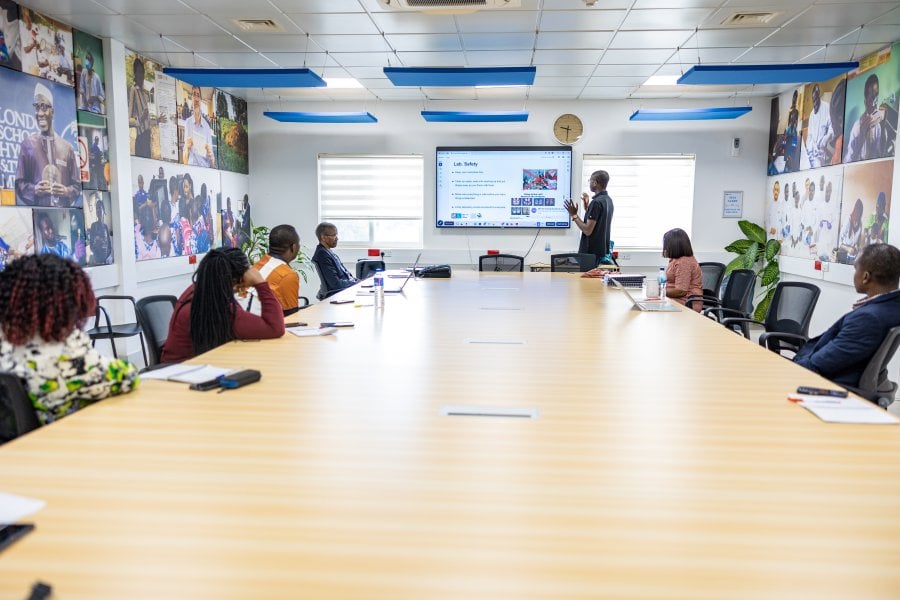
Individuals having a meeting in a seminar room
The training is part of the Coalition for Epidemic Preparedness Innovations (CEPI)’s 100 days mission, which seeks to enhance epidemic response and research preparedness in West Africa. Specifically, it focuses on strengthening clinical trial capabilities in countries endemic to Lassa Fever. The program was designed to improve the biosafety and biosecurity skills of laboratory scientists and will culminate in the creation of a comprehensive biosafety and biosecurity manual for each participating laboratory.
Dr. Alpha A. Diallo, Lead Consultant from Health & Education Quality Systems Strengthening (HEQSS) in Guinea, said; “Biosafety and biosecurity are fundamental to the success of any laboratory. The absence of well-defined biosafety protocols and a strong safety culture compromises a laboratory’s ability to securely handle and manage high-risk pathogens, such as the Lassa virus.”
According to Yai Louise Ndure-Bensouda, Head of Quality at MRCG at LSHTM, the training is a vital step in ensuring that laboratory staff in West Africa are equipped with the knowledge and skills to safely handle infectious pathogens and contribute to the region’s epidemic preparedness.
“Hosting the biosafety and biosecurity training at MRCG at LSHTM further shows our commitment to advancing research and epidemic preparedness in West Africa. We wanted participants to experience the full range of required processes - from going through a health and safety induction before entering a laboratory to properly separating waste after laboratory work.”
Laboratory biosafety and biosecurity controls are often overlooked the training therefore emphasised the need for a risk-based approach to develop and maintain practical, relevant systems for safe, ethical, and responsible laboratory activities, she added.
Gbenga-Ayeni B. Olufunke, Medical Laboratory Scientist at Federal Medical Centre, Owo, Nigeria, highlighted the significance of the training and how it will support her institution’s laboratory safety protocols. “The training will strengthen and enhance my knowledge about Biosafety and Biosecurity. I hope to learn new things which will improve my work and make me a better scientist.”
Suleiman Alhaji, a Lab Manager at Abubakar Tafawa-Balewa Teaching Hospital, Bauchi, Nigeria, commented that the training introduced him to vital information that he looks forward to sharing with his colleagues through a step-down training. “Biosafety is fundamental to the work we do in handling high risk materials, for us to effectively serve the community and support our patients in the hospital. This means we must take steps to protect ourselves and ensure the safety of the environment. Biosafety and biosecurity are critical in achieving these goals."
At the end of their training, participants had the opportunity to tour the MRCG at LSHTM’s Biobank and Molecular Biology Laboratories to experience the Unit’s laboratory practices and protocols.
If you enjoyed this article and would like to build a career in global health, we offer a range of MSc programmes covering health and data, infectious and tropical diseases, population health, and public health and policy.
Available on campus or online, including flexible study that works around your work and home life, be part of a global community at the UK's no.1 public health university.
